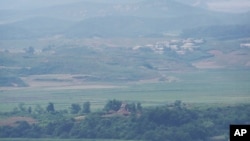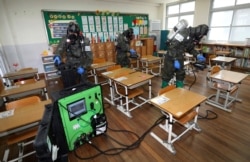South Korea has acknowledged that a North Korean defector, who had been accused of rape in the South, may have sneaked past South Korean border guards before apparently swimming back to his North Korean homeland.
At a briefing Monday, South Korean military officials said they found the man’s bag near a drainage ditch he apparently used to get under a barbed wire fence on the northeastern island of Ganghwa, which is separated from North Korea by a portion of the Han River Estuary.
The 24-year-old, who fled North Korea in 2017, had recently been accused of raping another defector and was the subject of an arrest warrant in the South, according to South Korean media reports. He had also recently lost his job, the reports say.
But South Korean health officials said the re-defector was not registered as a COVID-19 patient or as someone who had come in contact with infected individuals.
That undermines North Korea’s accusation that the man may have brought the coronavirus into the communist country.
Apparently referring to the same person, North Korean state media on Sunday said a “runaway” suspected to be carrying the coronavirus returned to the North on July 19th “after illegally crossing the demarcation line” that separates the two Koreas.
It was the first time North Korea has acknowledged a possible coronavirus infection. North Korea has declared a state of emergency and imposed a lockdown around Kaesong City, the border town where the re-defector was found.
Why admit it now?
Even though 16 million coronavirus infections have been reported worldwide, North Korea had long insisted it was completely free of the virus - a claim most outside observers said was practically impossible.
North Korea shares a 1,400-kilometer-long border with China, where the virus originated. Although the North formally closed its borders in February, much of its trade with China is informal and hard to control.
Many analysts said North Korea may be using the incident to finally acknowledge a coronavirus outbreak, even while blaming South Korea.
“This would make for an extremely convenient way for the regime to admit the existence of COVID-19 in the country,” wrote Benjamin Katzeff Silberstein, a North Korea specialist at the Foreign Policy Research Institute.
“The message is: our anti-epidemic measures, such as closing the northern border, were flawless. But one case still slipped through the cracks," he said. "Having a first confirmed case coming in from the south relieves the regime of any awkwardness vis-a-vis China."
The move could also have a domestic message, says Go Myong-Hyun, a research fellow at the Seoul-based Asan Institute for Policy Studies.
“They're trying to send a message that North Korea is under siege, that there is a lot of infection going on outside of North Korea, and that the regime is trying their utmost to keep the country clean and effective," he said.
In recent months, North Korea has hurled aggressive rhetoric at the South, accusing it of prioritizing relations with Washington over Pyongyang.
“It goes along with the spin that South Korea is not to be trusted,” says Go. “They are trying to attach this negative image of an infection, virus, and pandemic along with South Korea and the defectors at the same time.”
Border security lapses
The defector incident has also raised concerns about possible security lapses along the 250-kilometer border that separates North and South Korea.
A politburo meeting convened Saturday by North Korean leader Kim Jong Un chastised the “loose guard performance in the frontline area” where the runaway occurred and vowed possible “severe punishment,” according to state media.
When North Koreans flee their country, they usually do so via the border with China, since the border between North and South Korea is one of the most heavily fortified in the world.
But somehow the defector at the center of North Korea’s coronavirus claims appears to have crossed the inter-Korean border twice.
The defector, surnamed Kim, detailed his 2017 escape from North Korea in a pair of YouTube interviews last month with another defector.
“I decided to escape because of poverty,” he said in the interview that surfaced Monday.
Kim said it took more than seven hours to reach South Korea. The journey, he said, included crossing a minefield, going through barbed wire and electric fences, and swimming across the Han River.
The number of North Korean defectors reaching the South has steadily fallen in recent years, as North Korea and China tighten border controls. The coronavirus has only made things more difficult. During the second quarter of this year, the number of incoming defectors reached an all-time low, with only 12 reaching the South.
North Koreans who have fled to the South rarely return. Since 2015, only 11 North Korean defectors have gone back to the North, South Korea’s Unification Ministry said Monday.





